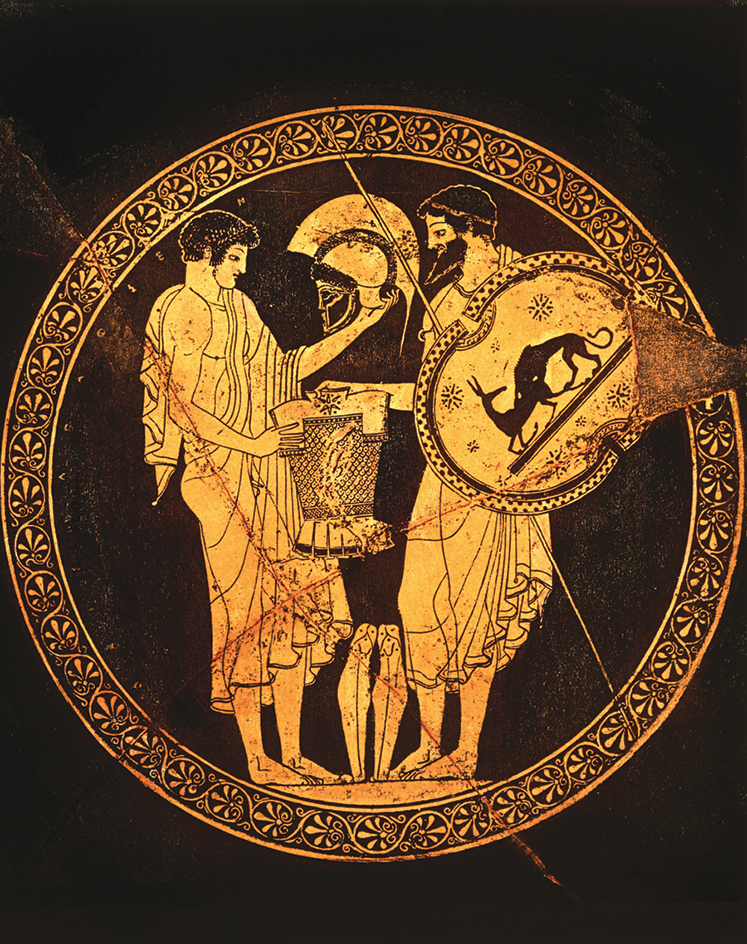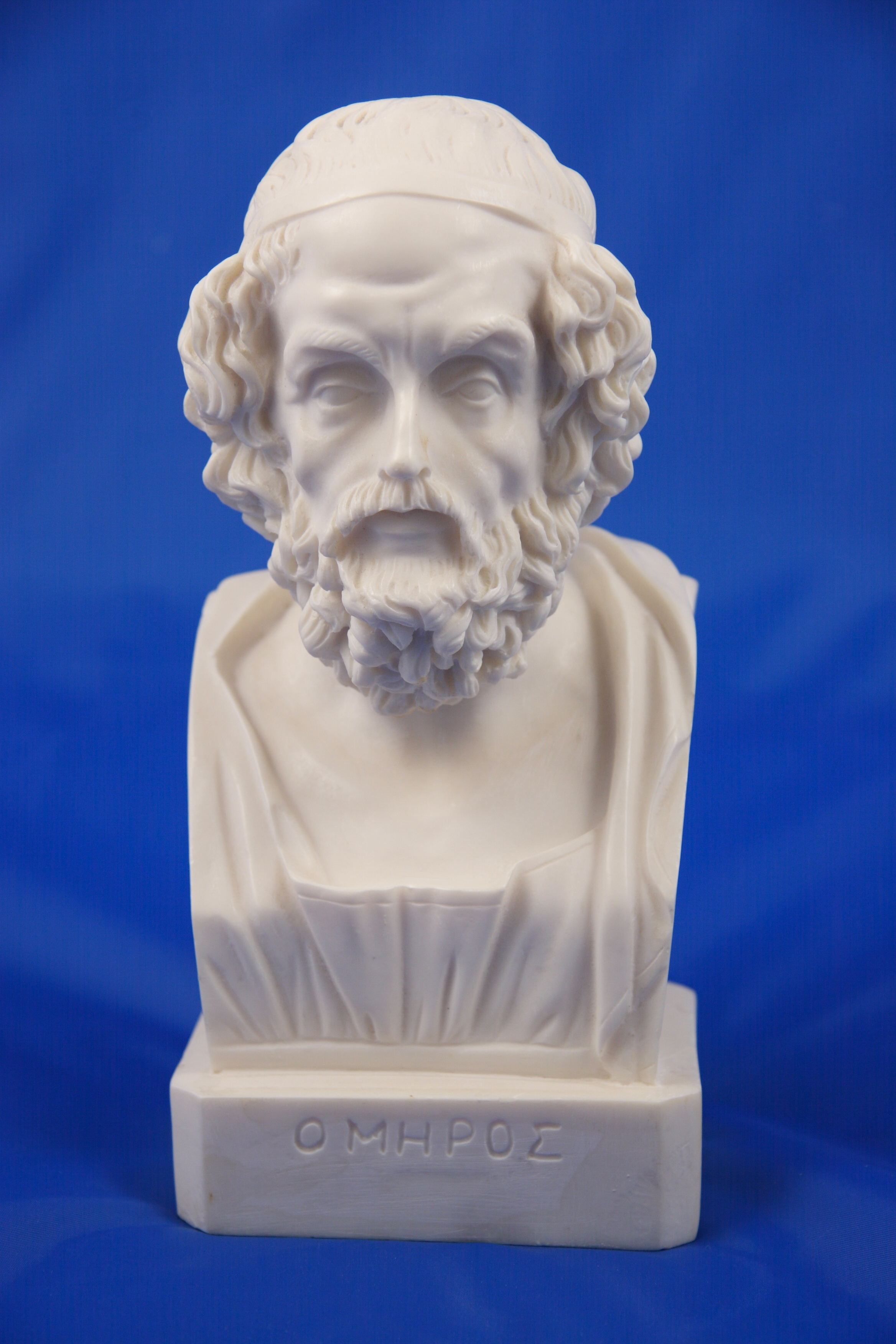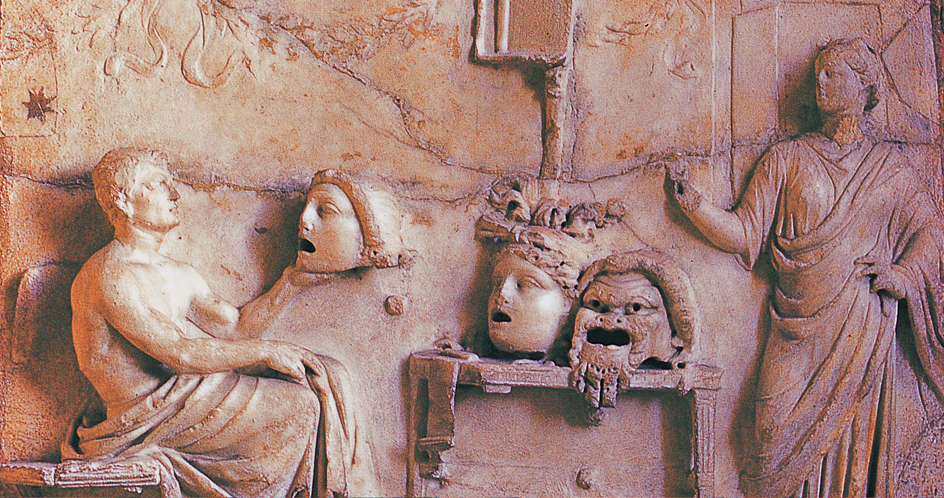Greek literature is the oldest and most influential national literature in the Western world. Ancient Greek literature became the model for all later literature in the West, starting with Latin literature. Greek writers introduced many significant types of literature, including lyric and epic poetry, tragic and comic drama, philosophical essays and dialogues, critical and biographical history, and literary studies. In continuous use for some 3,500 years, the Greek language has the longest history among Indo-European languages.

Early Greek literature
Epic poetry
was the first important form of Greek literature. Epics are long narrative poems. Most tell about the heroic deeds of divine beings or mortals. The greatest Greek poet was Homer, who composed two famous epic poems, the Iliad and the Odyssey, in the 700’s B.C. The Iliad tells of the Trojan War, which probably occurred about 1200 B.C. The Odyssey relates the adventures of the Greek hero Odysseus as he returns home after the fall of Troy. The epics developed from a tradition of oral poetry that covered about 500 years. They were based on stories recited by professional singers who accompanied themselves with a stringed instrument called the lyre. The Iliad and the Odyssey emphasized ideals of honor and bravery and had enormous influence on Greek culture and education as well as literature.

Hesiod, the founder of the didactic (instructional) epic, was the first major Greek poet after Homer. Hesiod wrote in the 600’s B.C. With his poem Theogony, Hesiod became the first writer to organize Greek mythology into a comprehensive philosophical system. Hesiod’s other great poem, Works and Days, describes the life of Greek peasants, highlighting their hard work, thrift, and good judgment. The poem points out that Homer’s aristocratic ideal of valor in battle is not the only kind of heroism possible. Hesiod, himself a farmer, also praised the heroism of the farmer’s long silent struggle with nature.
Lyric poetry.
After about 650 B.C. shorter forms of poetry called lyrics began to replace the epic. Lyric poetry originally was sung to the music of the lyre. Most lyric poems described personal feelings instead of the acts of heroism portrayed in epic poetry.
One type of lyric poetry is melic poetry. Melic poems were composed for a single voice and sung in intimate settings. Sappho, a poet who lived about 600 B.C., was the most famous melic poet. No Greek love poetry has ever matched the passion and tragic feeling of her verse.
Other lyric poets composed choral lyrics. These were sung by groups and accompanied by music and dancing. The epinikion, a serious choral ode written to honor the victor of athletic games, was a popular poetic form. The victory odes of Pindar are masterpieces of choral poetry.
Elegiac poetry is serious and often expresses sorrow. Iambic poetry, another form of lyric poetry, expresses anger or is satiric, meaning it pokes fun at something.
The Golden Age
During the late 500’s B.C., Athens became the center of Greek culture, a position it held for almost 200 years. During the height of this period, from 461 to 431 B.C., the arts—especially literature—flourished. These 30 years are sometimes called the Golden Age.
Drama,
particularly tragedy, became the most important literary form during the Golden Age. Aeschylus, Sophocles, and Euripides were the three greatest tragic playwrights. The plays of Aeschylus are noted for their seriousness, majestic language, and complexity of thought. Sophocles is most famous for his characterization, graceful language, and sense of calm and proportion. Euripides was called the “philosopher of the stage.” His plays explore the psychological world of human emotions and passions.
Comedy was also prominent on the Athenian stage in the 400’s B.C. Aristophanes, who wrote plays in the style called Old Comedy, was a great writer of bawdy and satiric comic plays. His plays reflect the spirit of Athens at that time, with the Athenians’ sense of freedom, vitality, and high spirits, and their ability to laugh at themselves.
After Athens was defeated in the Peloponnesian War in 404 B.C., there was less freedom of speech. Old Comedy, with its elements of political and social satire, was no longer permitted by government leaders. Comedy revived in Athens in the late 300’s B.C., but in a style called New Comedy. This style focused on the individual and the problems people confront in everyday life. Menander was the most popular writer of such plays.

Historical literature.
By the end of the 400’s B.C., prose had surpassed poetry and verse drama in Greek literature. Historical writings were especially popular. Herodotus, “Father of History,” traveled throughout the civilized world during the mid-400’s B.C. and recorded the manners and customs of nations older than Greece. His central theme was the conflict between East and West. Thucydides, writing later, was the first scientific historian. He wrote a stirring account of the Peloponnesian War. In recording the events of his day, he tried to explain the effects of politics on historical events.
Philosophical literature.
About 450 B.C., a group of philosophers called Sophists became prominent. Sophists were scholars and teachers of theories of knowledge. Their great literary invention was rhetoric, the art of composing and delivering persuasive speeches. The Sophist movement contributed to the rise of prose, especially oration (formal speech), over poetry in Athens. Such famous writers of orations as Isocrates and Demosthenes were important political figures.
A new literary form was developed by pupils of Socrates, after the philosopher’s death in 399 B.C. Called the Socratic method or dialectic, it was based on Socrates’s question-and-answer method of arriving at an important truth. Although Socrates left no writings, his ideas are preserved in writings of other Greeks, especially Plato. Other groups of philosophers, such as the Epicureans, the Stoics, and the Peripatetics, reflected the concerns of Plato’s writings. Aristotle also wrote important works, including Poetics, a masterpiece of literary criticism.
The Hellenistic Age
During the 300’s B.C., the Macedonian king Alexander the Great conquered and ruled all of ancient Greece and most of the rest of the civilized world of his day. As Alexander’s empire grew, Greek ideas and culture, including the Greek language, spread throughout the East. The period after Alexander’s death in 323 B.C. is called the Hellenistic Age. At this time, Athens lost its dominant role as the center of Greek culture, and the city of Alexandria in Egypt became the new capital of Greek civilization.
Theocritus, an important poet writing in the 200’s B.C., is credited with inventing pastoral poetry. Pastoral poems convey an appreciation for nature and country life. Theocritus’s poems reflect the discontent of those living in the increasingly overpopulated cities of the Hellenistic era. The chief literary figure of this period was Callimachus, a scholar, poet, and critic who wrote short, highly polished poems. Many poets followed Callimachus’s example and produced powerful poetry within the narrow limits of brief, witty poems called epigrams. Not all poets approved of the trend to short poems. Apollonius of Rhodes favored traditional long epic poetry and wrote the long romantic epic the Argonautica in the 200’s B.C.
The Greco-Roman Age
The period following the Hellenistic Age is known as the Greco-Roman Age because of the Roman conquest of Greece in 146 B.C. During Roman rule, prose again became the most prominent literary form. The biographer and essayist Plutarch is most famous for his biographies contrasting Greek and Roman leaders in Parallel Lives of Illustrious Greeks and Romans. Later, Lucian of Samosata wrote amusing commentaries that satirized the popular philosophical schools of his day.
Renewed interest in oratory and rhetoric brought about the Second Sophistic Movement in the A.D. 100’s. During this period, Epictetus, a former slave, became the spokesman of the Stoic school of thought. His philosophy emphasizes acceptance and endurance.
Many new and varied types of writing appeared in the A.D. 100’s. The travel writer Pausanias wrote a description of ancient Greece that remains a valuable source of Greek history and religion. A physician named Galen wrote medical works on anatomy, physiology, and psychology. Ptolemy, an astronomer, geographer, and mathematician, also wrote influential scientific works. In the Sophists’ Banquet, Athenaeus of Naucratis pretends to record a dinner table discussion between 29 famous wise men. Longus wrote an influential pastoral romance, Daphnis and Chloë, in the A.D. 100’s or 200’s. This work generally is considered a forerunner of the novel.
The most important writer of the 200’s was Plotinus, founder of the Neoplatonic school of philosophy. His work was the last great creation of ancient philosophy.
Medieval literature
In A.D. 395, the Roman Empire split into the West Roman and East Roman (Byzantine) empires. Byzantine rule lasted in Greece until the Ottoman Empire conquered the region during the 1300’s to mid-1400’s. The Byzantine capital, Constantinople (now Istanbul), was the center of Greek culture for 1,000 years. The Byzantine arts reflect the combination of Greek learning and literary tradition with the teachings of Christianity. Christian religious poetry became the most prominent Greek literature of the Middle Ages (about the 400’s through the 1400’s).
Romanos the Melodist, who lived in the 500’s, was the greatest Greek poet of the Middle Ages. He was the chief composer of kontakia (singular kontakion), long metrical (rhythmically patterned) hymns especially popular in the 500’s and 600’s. After the 800’s, and notably during the 1100’s, Byzantine literature included historical works, satiric poems, and prose narratives in the tradition of pastoral romances of the A.D. 200’s and 300’s.
Modern Greek literature
From the mid-1400’s to the early 1800’s,
folk songs and folk tales dominated Greek literature in Ottoman territory. In other Greek-speaking lands, a style of poetry that was more personal than the religious hymns of the Middle Ages flourished. For example, on Crete, Vitsentzos Kornaros wrote the poetic romance Erotocritos in the early 1600’s. Another Cretan masterpiece of the same period is the tragic play Erophile by Georgios Chortatsis.
Poetry.
The first great modern Greek poet to emerge after Greek independence in 1832 was Dionysios Solomos. Writing in the early 1800’s, he used demotic Greek, the everyday language of the Greek people. Before Solomos, katharevousa, the official scholarly form of Greek, dominated Greek literature. The Demotic Movement of the 1880’s, led by the great poet Kostis Palamas, helped establish demotic as the preferred medium for poetry.
Modern Greek poetry began to gain international respect in the 1900’s. The work of Constantine Cavafy, first translated after the poet’s death in 1933, blends intimacy, detachment, historical perspective, and personal detail. Its popularity made Cavafy the most widely read and translated modern Greek poet. The work of Yannis Ritsos, a poet who achieved fame after the 1940’s, includes mythological, personal, and left-wing political themes.
In 1963, poet George Seferis became the first Greek to win the Nobel Prize in literature. His work calls forth the ancient past amidst modern reality. Another Greek poet, Odysseus Elytis, won the Nobel Prize in 1979. The writing of Elytis, nicknamed the “poet of the Aegean,” celebrates Greece’s natural and cultural riches. Women poets, including Katerina Anghelaki-Rooke, Kiki Dimoula, Jenny Mastoraki, and Athena Papadaki, acquired an important voice in the 1900’s. By the 1970’s, the number of works by female and male poets was evenly balanced. In addition, Greek poetry was marked by an absence of lyricism and a questioning of traditional women’s roles.
Fiction.
During the 1900’s, the novel also developed and gained popularity. Before World War I (1914-1918), Greek prose was limited largely to short stories describing provincial life and customs. Postwar novelists wrote about broader themes. Their work often recounted wartime experiences and reflected a search for national and personal identity. Stratis Myrivilis achieved renown with such war-themed novels as Life in the Tomb (first published in serial form in 1923-1924; revised edition 1930). Kosmas Politis is known for Eroica (1937), a coming-of-age novel that calls forth the instability of the postwar years. In the mid-1900’s, the poet and playwright Nikos Kazantzakis turned to fiction. He wrote powerful novels with larger-than-life heroes who grappled with questions of human existence. His novels include The Greek Passion (1954) and The Last Temptation of Christ (1955).
Greek novels of the 1960’s and 1970’s were characterized by Realism (a style that tries to portray things without personal judgment or emotion) and political ideology (belief systems). By the 1980’s, the novel had become the most prestigious and popular form of Greek literature. Individual themes began to replace collective ones.
In the 1990’s and the first decade of the 2000’s, at least half of the most successful novels published were written by women. For example, the novels of Rhea Galanaki and Margarita Karapanou explore modern Greek identity from a woman’s perspective.
Greek drama
of the 1900’s and early 2000’s generally followed the same thematic development as the Greek novel. Globalization (worldwide interconnectedness) and economic difficulties fueled a literary trend of introspection (looking within) and tormented self-analysis in the 1990’s and early 2000’s. This trend is present in the work of such playwrights as Iakovos Kambanellis, Pavlos Matesis, and Marios Pontikas.
